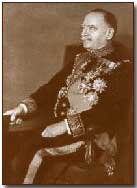Primary Documents - Baron Charles de Broqueville on President Wilson's Addendum to the Fourteen Points, 28 February 1918
 Reproduced below is the
text of an official statement issued by the Belgian Prime Minister,
Baron
Charles de Broqueville, regarding the Fourteen Points, dated 28
February 1918.
Reproduced below is the
text of an official statement issued by the Belgian Prime Minister,
Baron
Charles de Broqueville, regarding the Fourteen Points, dated 28
February 1918.
The Fourteen Points comprised a recipe for peace devised by U.S. President Woodrow Wilson in a speech to the U.S. Congress on 8 January 1918, and subsequently clarified in a further speech to Congress on 11 February 1918.
German reaction to Wilson's speeches was prompt. German Chancellor Count Hertling's swiftly express qualified support in speeches to the Reichstag on 24 January 1918 and 25 February 1918. In the course of these Count Hertling expressed the view that Germany's current occupation of Belgium could legitimately be used as a bargaining chip during peace negotiations, a position denounced by the British Foreign secretary Arthur Balfour in a speech to Parliament on 27 February.
It was in this context that Baron de Broqueville issued a brief statement on the day following Balfour's speech in which he reiterated that negotiations for peace involving Belgium could only take place with the active support and cooperation of the Allied powers which had guaranteed Belgian independence.
Official Statement of Belgian Prime Minister Baron Charles de Broqueville on the Fourteen Points, 28 February 1918
The Belgian Government's views are known and have not changed. It affirmed them quite recently.
In its answer to the Holy See on December 24th the Belgian Government said:
The integrity of the metropolitan and colonial territory; political, economic and military independence without condition or restriction; reparation for damages and guarantees against repetition of the aggression of 1914 are the indispensable conditions for a just peace as far as Belgium is concerned.
The Belgian Government has already declared and repeated that it will not discuss peace except in consort with the powers which guaranteed its independence and which have fulfilled their obligations toward Belgium.
Source: Source Records of the Great War, Vol. VI, ed. Charles F. Horne, National Alumni 1923
A Flechette was an anti-personnel dart dropped from an aircraft.
- Did you know?
